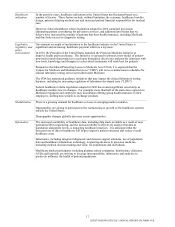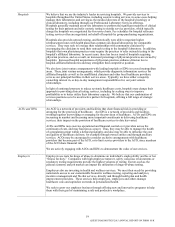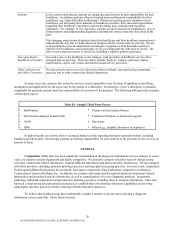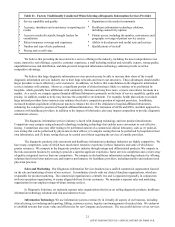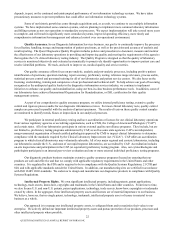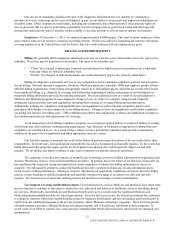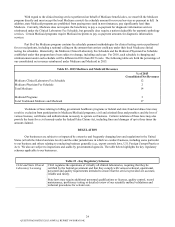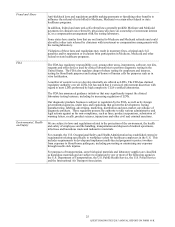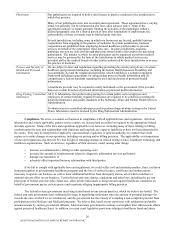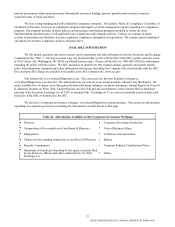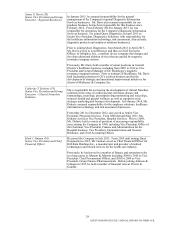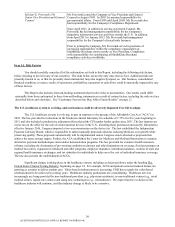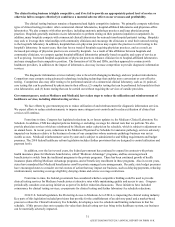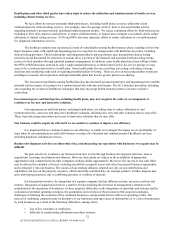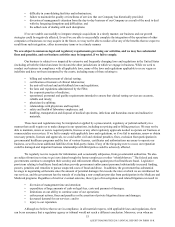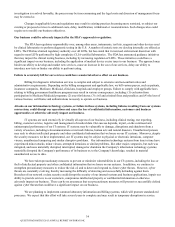Quest Diagnostics 2015 Annual Report Download - page 30
Download and view the complete annual report
Please find page 30 of the 2015 Quest Diagnostics annual report below. You can navigate through the pages in the report by either clicking on the pages listed below, or by using the keyword search tool below to find specific information within the annual report.
26
Physicians Our pathologists are required to hold a valid license to practice medicine in the jurisdiction in
which they practice.
Many of our pathologists enter into an employment agreement. These agreements have varying
terms, but generally can be terminated at any time, upon advance notice. Most of the
agreements contain covenants generally limiting the activities of the pathologist within a
defined geographic area for a limited period of time after termination of employment; the
enforceability of these covenants may be limited under state law.
Several jurisdictions, including some in which our businesses are located, prohibit business
corporations from engaging in the practice of medicine. In certain jurisdictions, business
corporations are prohibited from employing licensed healthcare professionals to provide
services on behalf of the corporation; these laws vary. In some jurisdictions, anatomic
pathology services are delivered through physician-owned entities that employ the practicing
pathologists. The manner in which licensed physicians can be organized to perform medical
services may be governed by the laws of the jurisdictions in which medical services are
provided and by the medical boards or other entities authorized by these jurisdictions to oversee
the practice of medicine.
Privacy and Security of
Health and Personal
Information
We are subject to laws and regulations regarding protecting the security and privacy of certain
healthcare and personal information, including the federal Health Insurance Portability and
Accountability Act and the regulations thereunder, which establish (i) a complex regulatory
framework including requirements for safeguarding protected health information and (ii)
comprehensive federal standards regarding the uses and disclosures of protected health
information.
A healthcare provider may be required to notify individuals or the government if the provider
discovers certain breaches of personal information or protected health information.
Drug Testing; Controlled
Substances All U.S. laboratories that perform drug testing for certain public sector employees and
employees of certain federally regulated businesses are required to be certified as meeting the
detailed performance and quality standards of the Substance Abuse and Mental Health Services
Administration.
To obtain access to controlled substances used to perform drugs-of-abuse testing in the United
States, laboratories must be licensed by the Drug Enforcement Administration.
Compliance. We strive to conduct our business in compliance with all applicable laws and regulations. All of our
laboratories and, where applicable, patient service centers, are licensed and accredited as required by the appropriate federal
and state agencies. Many of the laws and regulations applicable to us, however, including many of those relating to billing,
reimbursement for tests and relationships with clinicians and hospitals, are vague or indefinite or have not been interpreted by
the courts. They may be interpreted or applied by a prosecutorial, regulatory or judicial authority in a manner that could
require us to make changes in our operations, including our pricing and/or billing practices. The applicability or interpretation
of laws and regulations also may not be clear in light of emerging changes in clinical testing science, healthcare technology and
healthcare organizations. Such occurrences, regardless of their outcome, could, among other things:
• increase our administrative, billing or other operating costs;
• decrease the amount of reimbursement related to diagnostic information services performed;
• damage our reputation; or
• adversely affect important business relationships with third parties.
If we fail to comply with applicable laws and regulations, we could suffer civil and criminal penalties, fines, exclusion
from participation in governmental healthcare programs and the loss of various licenses, certificates and authorizations
necessary to operate our business, as well as incur additional liabilities from third-party claims, all of which could have a
material adverse effect on our business. Certain federal and state statutes, regulations and other laws, including the qui tam
provisions of federal and state false claims acts, allow private individuals to bring lawsuits against healthcare companies on
behalf of government payers, private payers and/or patients alleging inappropriate billing practices.
The federal or state governments may bring claims based on our current practices, which we believe are lawful. The
federal and state governments have substantial leverage in negotiating settlements since the amount of potential damages far
exceeds the rates at which we are reimbursed, and the government has the remedy of excluding a non-compliant provider from
participation in the Medicare and Medicaid programs. We believe that, based on our experience with settlements and public
announcements by various government officials, federal and state governments continue to strengthen their enforcement efforts
against perceived healthcare fraud. In addition, in recent years legislative provisions relating to healthcare fraud and abuse
QUEST DIAGNOSTICS 2015 ANNUAL REPORT ON FORM 10-K



